牛津译林版八年级下册Unit 1《Past and present》word导学案5
牛津译林版八年级英语下册 Unit 1 Past and Present (Integrated
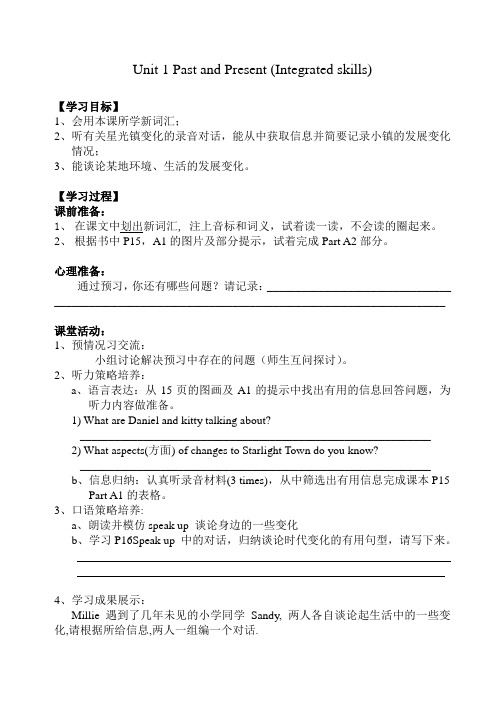
Unit 1 Past and Present (Integrated skills)【学习目标】1、会用本课所学新词汇;2、听有关星光镇变化的录音对话,能从中获取信息并简要记录小镇的发展变化情况;3、能谈论某地环境、生活的发展变化。
【学习过程】课前准备:1、在课文中划出新词汇,注上音标和词义,试着读一读,不会读的圈起来。
2、根据书中P15,A1的图片及部分提示,试着完成Part A2部分。
心理准备:通过预习,你还有哪些问题?请记录:________________________________ ____________________________________________________________________课堂活动:1、预情况习交流:小组讨论解决预习中存在的问题(师生互问探讨)。
2、听力策略培养:a、语言表达:从15页的图画及A1的提示中找出有用的信息回答问题,为听力内容做准备。
1) What are Daniel and kitty talking about?_____________________________________________________________2) What aspects(方面) of changes to Starlight Town do you know?_____________________________________________________________b、信息归纳:认真听录音材料(3 times),从中筛选出有用信息完成课本P15Part A1的表格。
3、口语策略培养:a、朗读并模仿speak up 谈论身边的一些变化b、学习P16Speak up 中的对话,归纳谈论时代变化的有用句型,请写下来。
4、学习成果展示:Millie 遇到了几年未见的小学同学Sandy, 两人各自谈论起生活中的一些变化,请根据所给信息,两人一组编一个对话.____________________________________________________________________ ____________________________________________________________________ ____________________________________________________________________ ____________________________________________________________________ ____________________________________________________________________ ____________________________________________________________________ ____________________________________________________________________ 5、当堂反馈小结:怎样才能从听力材料中获取需要的信息?_________________________ ____________________________________________________________________ ____________________________________________________________________拓展延伸:根据短文和首字母填空,使短文意思通顺。
牛津译林版英语八下 Unit 1 Past and present

八下Unit 1 Past and presentWelcome to the unit1. 一个小时前__________________________________________________2. 过去经常和我分享食物__________________________________________________3. 过去对我很好__________________________________________________4. 做一个关于近年来北京所发生的变化的历史课题______________________________________________________________________________5. 不同时期的交通__________________________________________________6. 不同的交通形式__________________________________________________7. 逛这个城市__________________________________________________8. 去其他城市__________________________________________________9. 等下一班车要花好长时间。
__________________________________________________10. 乘公交车去上学既方便又快捷。
_______________________________________________ Reading11. 写阳光镇的变化__________________________________________________12. 采访他以获得一些信息__________________________________________________13. 很了解阳光镇__________________________________________________14. 你对阳光镇有多了解?__________________________________________________15. 你了解阳光镇什么呢?__________________________________________________16. 自从出生我就一直住在这里。
最新牛津译林版八年级下册unit 1《past and present》教案.doc

The unders tanding of the reading
学法指导
Task-centered approach
教具准备
课件
教学步骤
二次备课
Step 1 Free talk .
Where is your hometown?
Has it changed a lot?
Can you tell us something about the changes to your hometown?
1. Would you like to listen to Mr Chen, Daniel’s grandpa? Play the ta pe for Ss 2 times. Answer the following questions.
How long has Mr Chen known Sunshine Town?
As you know, I am a teacher now. But five years ago, I was a teacher, too. So I have worked here for 3 years. I think our school changed a lot. Do you think so? Everything has changed a lot?
Did Mr Chen live there all the time? Why?
Does Mr Chen think the place changed a lot?
What are the differences between the past and present?
2.Check the answers if they can not answer.
牛津译林版八年级英语下册8Bunit1 past and present 课文要点全解
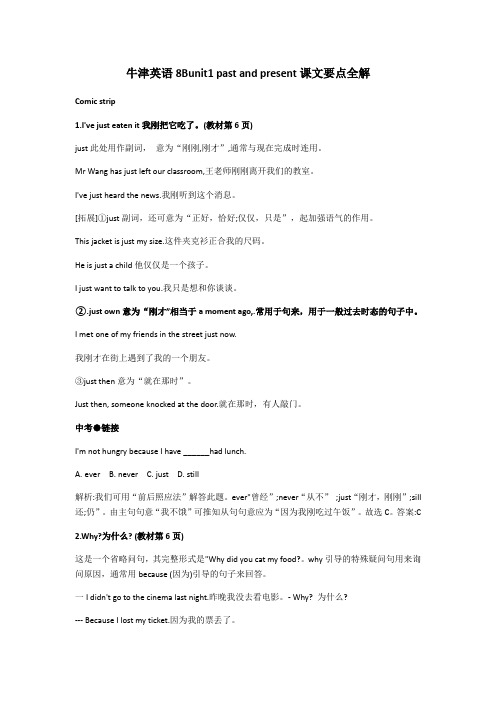
牛津英语8Bunit1 past and present课文要点全解Comic strip1.I've just eaten it我刚把它吃了。
(教材第6页)just此处用作副词,意为“刚刚,刚才”,通常与现在完成时连用。
Mr Wang has just left our classroom,王老师刚刚离开我们的教室。
I've just heard the news.我刚听到这个消息。
[拓展]①just副词,还可意为“正好,恰好;仅仅,只是”,起加强语气的作用。
This jacket is just my size.这件夹克衫正合我的尺码。
He is just a child他仅仅是一个孩子。
I just want to talk to you.我只是想和你谈谈。
②.just own意为“刚才”相当于a moment ago,.常用于句来,用于一般过去时态的句子中。
I met one of my friends in the street just now.我刚才在街上遇到了我的一个朋友。
③just then意为“就在那时”。
Just then, someone knocked at the door.就在那时,有人敲门。
中考●链接I'm not hungry because I have ______had lunch.A.everB. neverC. justD. still解析:我们可用“前后照应法”解答此题。
ever"曾经”;never“从不”;just“刚才,刚刚”;sill 还;仍”。
由主句句意“我不饿”可推知从句句意应为“因为我刚吃过午饭”。
故选C。
答案:C2.Why?为什么? (教材第6页)这是一个省略问句,其完整形式是"Why did you cat my food?。
why引导的特殊疑问句用来询问原因,通常用because (因为)引导的句子来回答。
牛津译林版英语八下Unit 1《Past and Present》(Task)教学设计

牛津译林版英语八下Unit 1《Past and Present》(Task)教学设计一. 教材分析牛津译林版英语八下Unit 1《Past and Present》主要介绍了人们的生活在过去和现在是如何变化的。
通过对比过去和现在的生活,让学生学会使用过去时和现在时描述事物的变化。
本课时的Task部分主要让学生学会如何根据自己的需求选择合适的住房。
本节课的主要话题是房屋租赁和购买,学生需要掌握相关的词汇和句型,以及学会如何进行房屋租赁和购买的对话。
二. 学情分析学生在学习本节课之前,已经掌握了如何描述过去和现在的生活的语法知识,同时也具备了一定的房屋租赁和购买的相关词汇。
但是,学生对于如何在实际场景中运用这些知识和词汇进行对话还存在一定的困难。
因此,在教学过程中,教师需要帮助学生将这些知识和词汇应用到实际场景中,提高学生的实际语言运用能力。
三. 教学目标1.知识目标:–学生能够掌握并运用相关的词汇和句型描述房屋租赁和购买的情况。
–学生能够通过对比过去和现在的生活,学会使用过去时和现在时描述事物的变化。
2.能力目标:–学生能够在实际场景中运用所学的知识和词汇进行对话。
–学生能够提高自己的听、说、读、写的能力。
3.情感目标:–学生能够通过学习本节课,增强对英语学习的兴趣。
–学生能够学会如何根据自己的需求选择合适的住房。
四. 教学重难点•学生能够掌握并运用相关的词汇和句型描述房屋租赁和购买的情况。
•学生能够通过对比过去和现在的生活,学会使用过去时和现在时描述事物的变化。
•学生能够在实际场景中运用所学的知识和词汇进行对话。
•学生能够学会如何根据自己的需求选择合适的住房。
五. 教学方法1.情境教学法:通过设定真实的房屋租赁和购买的场景,让学生在实际情境中学习并运用所学的知识和词汇。
2.任务型教学法:通过完成具体的任务,让学生学会如何根据自己的需求选择合适的住房。
3.交际法:通过小组讨论和角色扮演等方式,让学生在课堂上进行真实的交际,提高学生的听、说、读、写的能力。
牛津译林版八年级英语下册Unit1基础练习(可编辑修改word版)
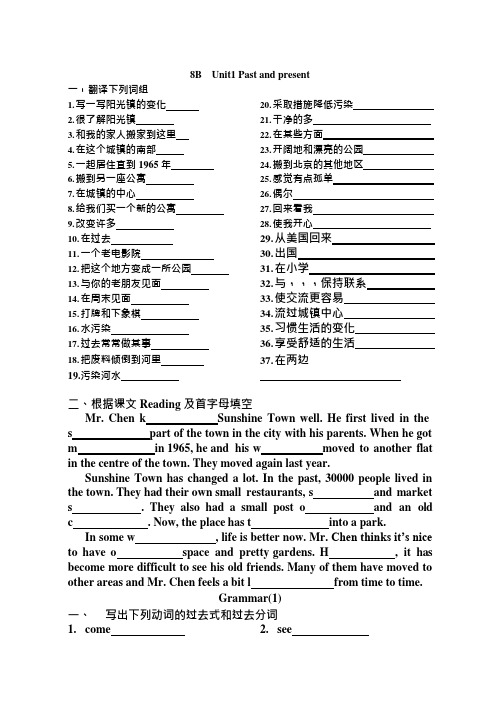
一,翻译下列词组8B Unit1 Past and present1.写一写阳光镇的变化2.很了解阳光镇3.和我的家人搬家到这里4.在这个城镇的南部5.一起居住直到1965 年6.搬到另一座公寓7.在城镇的中心8.给我们买一个新的公寓9.改变许多10.在过去11.一个老电影院12.把这个地方变成一所公园13.与你的老朋友见面14.在周末见面15.打牌和下象棋16.水污染17.过去常常做某事18.把废料倾倒到河里20.采取措施降低污染21.干净的多22.在某些方面23.开阔地和漂亮的公园24.搬到北京的其他地区25.感觉有点孤单26.偶尔27.回来看我28.使我开心29.从美国回来30.出国31.在小学32.与,,,保持联系33.使交流更容易34.流过城镇中心35.习惯生活的变化36.享受舒适的生活37.在两边19.污染河水二、根据课文Reading 及首字母填空Mr. Chen k Sunshine Town well. He first lived in the s part of the town in the city with his parents. When he got m in 1965, he and his w moved to another flat in the centre of the town. They moved again last year.Sunshine Town has changed a lot. In the past, 30000 people lived in the town. They had their own small restaurants, s and market s . They also had a small post o and an old c . Now, the place has t into a park.In some w , life is better now. Mr. Chen thinks it’s nice to have o space and pretty gardens. H , it has become more difficult to see his old friends. Many of them have moved to other areas and Mr. Chen feels a bit l from time to time.Grammar(1)一、写出下列动词的过去式和过去分词1. come2. see3.give4.write5.make6.put7.go8.see9.forget二、现在完成时10.learn11.decide12.repair13.finish14.14.play15.be1.定义:发生在过去的事情或动作,一直持续到现在并有可能继续持续下去。
Unit 1 Past and Present-牛津译林版英语八年级下册

R ea d in g
• B4 • 1. has changed a lot 2.beautiful modern • 3.waste/pollution 4.situation • 5.play cards and Chinese chess • 6.feel a bit lonely 7.see each other • 8.the amazing changes in the town
• Read the conversation from Line 1 to Line 6 carefully and answer the following questions.(4'
• (1). How long has Mr Chen lived in Sunshine Town? • (2). Where did Mr Chen and his wife move?
R ea d in g
R ea d in g
• Answers: • Part B1 • fgdbcea • Part B2 • FTTTFT • Part B3 • (1).northern (2).blocks (3).restaurants • (4)post office (5).cinema (6).theatre • (7).shopping mall (8).steel factory
2020牛津译林版八年级下册Unit1Pastandpresent1

Past and present教学目标1.认识和了解现在完成时的构成和用法。
2.了解过去分词的构成。
重点现在完成时与一般过去时的联系与区别。
难点现在完成时与一般过去时的联系与区别。
教法及教具教学过程教学内容个案调整教师主导活动学生主体活动Step1 PresentationS2: For four years.T: Yeah, E ddie has lived with Millie for four years.(板书)Step2 While-taskTask 1Let the students know th at the sentences on the boardall include the present perfect tense.Tell the students: We use the simple past tense to talk aboutwhat happened at a definite time in the pas t, like “Eddiewas born four years ago”.We use the present perfect tense to talk about things thatstarted in the past and still have some connection with thepresent, like ‘Ed die has lived with Millie since he wasbo rn’. ‘Eddie has l ived with M illie for four years.’Task 2We make positive and negative sentences using the presentperfect tense like this.subject have/ has+ (not)pastparticipleI/You/We/They have (not) moved.He/She/It has (not) moved.We form the present perfect tense by adding ‘have’or “ha s” before a past participle.e.g. have/has + seen/ done/ su ng/, etc.Ta sk 3Tell the student how to write the past participle of verbs.Read ,write andremember.1) We add ‘-ed’ to regular verbs. (板书SeePage13)2) We form the irregular verbs differently. We do not add‘-ed’. Ask the students to look at the table of irregular verbs on Page 121. Ask the students to remember the past participle of irregular verbs.动词原形动词过去式动词过去分词• A B B bring brought brought• A B C do did done• A A A let let let• A B A come came come• A A B beat beat beaten Task 4 (A1)H ere is a short exercise for students to fin ish. Ask thestudents to complete the table with the correct past participle on page 10. And then wo rk out the rule.Task 5 (A2)After the short exercise, ask the students to complete the sentences using the present perfect. Help them to complete.Ask them not to forget the verb ‘have’/ ‘has’.Present the Present perfect tense briefly.Subject + have/has+ past participleTask 6Teach the students how to ask and answer questions using the present perfect tense.Task7 Chat time (A3)Millie and Sandy are talking about a film a bout Hong Kong.Complete their conversation using the correct forms of the verbs in brackets.Step3 Post-taskI. 分清一般过去时与现在完成时I cleaned the blackboard half an hour ago(只说明“擦”和其发生的时间)I have cleaned the blackboard.(说明现在黑板是干净的)板书设计教学札记。
牛津译林版 8B八年级下册 Unit1 Past and present 知识点梳理
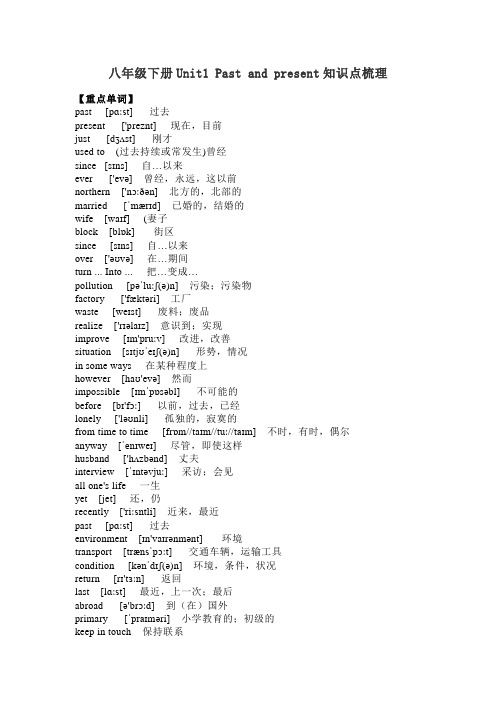
八年级下册Unit1 Past and present知识点梳理【重点单词】past [pɑːst]过去present ['preznt] 现在,目前just [dʒʌst] 刚才used to (过去持续或常发生)曾经since [sɪns] 自…以来ever ['evə] 曾经,永远,这以前northern ['nɔːðən] 北方的,北部的married [ˈmærɪd] 已婚的,结婚的wife [waɪf] (妻子block [blɒk] 街区since [sɪns] 自…以来over ['əʊvə] 在…期间turn ... Into ... 把…变成…pollution [pəˈluːʃ(ə)n] 污染;污染物factory ['fæktəri] 工厂waste [weɪst] 废料;废品realize ['rɪəlaɪz] 意识到;实现improve [ɪm'pruːv]改进,改善situation [sɪtjʊˈeɪʃ(ə)n] 形势,情况in some ways 在某种程度上however [haʊ'evə] 然而impossible [ɪmˈpɒsəbl] 不可能的before [bɪ'fɔː]以前,过去,已经lonely ['ləʊnli] 孤独的,寂寞的from time to time [frɒm//taɪm//tuː//taɪm] 不时,有时,偶尔anyway [ˈenɪweɪ] 尽管,即使这样husband ['hʌzbənd] 丈夫interview [ˈɪntəvjuː]采访;会见all one's life 一生yet [jet] 还,仍recently ['riːsntli]近来,最近past [pɑːst]过去environment [ɪn'vaɪrənmənt] 环境transport [trænsˈpɔːt]交通车辆,运输工具condition [kənˈdɪʃ(ə)n] 环境,条件,状况return [rɪ'tɜːn]返回last [lɑːst]最近,上一次;最后abroad [ə'brɔːd]到(在)国外primary [ˈpraɪməri] 小学教育的;初级的keep in touch 保持联系communicate [kəˈmjuːnɪkeɪt] 交流,交际communication [kəmjuːnɪˈkeɪʃ(ə)n] 交流,交际exactly [ɪg'zæktli] (答语)正是,没错be/get used to 习惯于,适应于narrow [ˈnærəʊ] 狭窄的open space 开阔的空地【重点词组】1.in the bowl an hour ago一个小时之前在碗里的ed to do sth.过去常常做某事be used to doing sth. 习惯于做某事be used to do sth. 被用来做某事3.do a history project on the changes in Beijing over the years做个有关这些年北京的变化的历史调查4.write a report on the changes in your home town 写一个有关你家乡的变化的报道5.know about the different forms of transport 对不同形式的交通工具很了解6.talk about transport at different times 讨论不同时期的交通工具7.take turns to do sth.=do sth. by turns 轮流做某事8.go to school by bike = ride a bike to school 骑自行车去学校9.wait for the next one 等下一辆车10.go to school by bus= take a bus to school= go to school on the bus乘公交车去学校11.interview sb. to get some information 为了得到些信息采访某人12.know sunshine town very well 对阳光镇很了解13.be born 出生14.move house 搬家15.in the northern part of town 在这个镇的西部16.get married to sb.= marry sb.= be married to sb.和某人结婚17.marry sb. to sb. 把某人嫁给某人18.move two blocks away搬到两个街区以外19.live in this area 住在这个地区20.since then 自从那以后since I was born/ since last Saturday/since three days ago21.over the years 这些年over the past century 在过去的几个世纪22.in the town centre= in the centre of the town 在镇中心23.turn/change/put sth. into 把某物变成某物24.a steel factory 一个钢铁厂25.put the waste into the river 把垃圾倒入河里put down 记下put away 收好put on 穿上put off 推迟、延期26.take action to improve the situation采取行动改善这种情况27.in some ways 在某些方面on the way (to ) 在……的路上by the way 顺便说no way 没门in any way 无论如何28.most of my old friends大部分我的老朋友29.move away 搬走/move to(into) another town30.see each other as often as before像以前一样经常看到对方31.play cards and Chinese chess 打牌和下棋32.feel a bit lonely 感到有点孤单33.from time to time = at times = sometimes 有时34.because of being alone 因为独自一人35.a group of buildings with streets on all sides街道两边全是高楼on both sides/ on each side36.interview sb.= have an interview with sb. 采访某人37.all his life 整个他的一生38.in the past 在过去at present 现在39.make some notes 做些笔记40.waste sth. on sth./ sb.浪费某物在某物/某人上41.repair over ten bicycles= repair more than ten bicycles修理超过10辆自行车42.teach sb. a lot about the history of China教我很多有关中国的历史43.talk about a film about the history of Beijing讨论一个有关北京历史的影片44.learn more about Beijing’s past and present对北京的过去和现在了解更多45.hear about/of 听说hear from sb.= receive/ get one’s letter=receive/get a letter of sb.收到某人来信46.living conditions 居住条件47.return sth. to sb. 把某物归还给某人48.go abroad 去国外at home or abroad 在国内外49.at primary school 在小学50.keep in touch with each other 互相保持联系51.make communication much easier使得联系更容易Communicate with sb.和某人保持联系52.take place发生(有目的有计划的)、举行happen发生(偶然发生)53.green hills all around到处都是绿山54.a river runs through the centre of town一条小河穿过镇中心55.get used to the changes of life习惯了生活的变化56.on one’s own = by oneself = alone独自57.throw rubbish 扔垃圾58.in some large open spaces在一些大的开阔的地方59.move into new flats搬到新公寓去60.in their free time在他们业余时间61.travel around the town在镇里转转62.have their own cars= have cars of their own有他们自己的汽车e the new words to talk about my hometown用些新词来讨论我的家乡e facts to support my opinions用事实来支持我的观点【重点句型】1.There were always too many people on the bus, and it took a long time to wait for the next one.公共汽车上总是有太多的人,并且要花费很长时间等待下一趟。
牛津译林版八年级下册Unit1《PastandPresent》说课稿
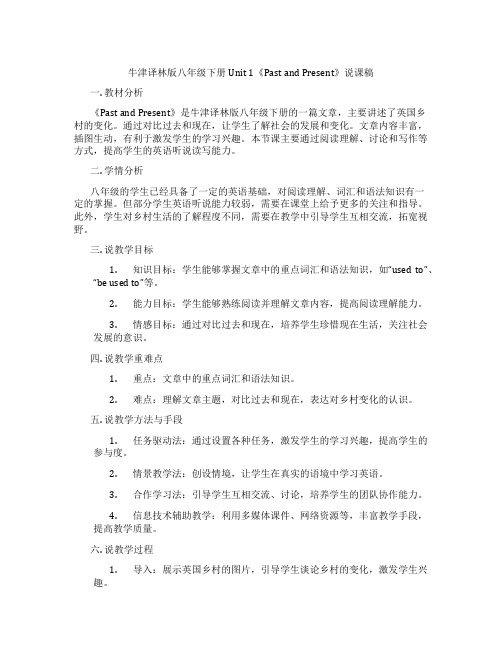
牛津译林版八年级下册Unit 1《Past and Present》说课稿一. 教材分析《Past and Present》是牛津译林版八年级下册的一篇文章,主要讲述了英国乡村的变化。
通过对比过去和现在,让学生了解社会的发展和变化。
文章内容丰富,插图生动,有利于激发学生的学习兴趣。
本节课主要通过阅读理解、讨论和写作等方式,提高学生的英语听说读写能力。
二. 学情分析八年级的学生已经具备了一定的英语基础,对阅读理解、词汇和语法知识有一定的掌握。
但部分学生英语听说能力较弱,需要在课堂上给予更多的关注和指导。
此外,学生对乡村生活的了解程度不同,需要在教学中引导学生互相交流,拓宽视野。
三. 说教学目标1.知识目标:学生能够掌握文章中的重点词汇和语法知识,如“used to”、“be used to”等。
2.能力目标:学生能够熟练阅读并理解文章内容,提高阅读理解能力。
3.情感目标:通过对比过去和现在,培养学生珍惜现在生活,关注社会发展的意识。
四. 说教学重难点1.重点:文章中的重点词汇和语法知识。
2.难点:理解文章主题,对比过去和现在,表达对乡村变化的认识。
五. 说教学方法与手段1.任务驱动法:通过设置各种任务,激发学生的学习兴趣,提高学生的参与度。
2.情景教学法:创设情境,让学生在真实的语境中学习英语。
3.合作学习法:引导学生互相交流、讨论,培养学生的团队协作能力。
4.信息技术辅助教学:利用多媒体课件、网络资源等,丰富教学手段,提高教学质量。
六. 说教学过程1.导入:展示英国乡村的图片,引导学生谈论乡村的变化,激发学生兴趣。
2.阅读理解:学生自主阅读文章,回答相关问题,检测学生对文章内容的理解。
3.词汇语法:讲解文章中的重点词汇和语法知识,如“used to”、“beused to”等。
4.讨论:分组讨论乡村的变化,引导学生发表自己的观点。
5.写作:以“My Hometown”为主题,让学生写一篇短文,描述家乡的变化。
最新牛津译林版八年级英语下册 Unit 1 Past and Present wordlist精品课件

• (2). Please remember the long words according to the syllables.(2') environment ---en vi ron ment
communication ---com mu ni ca tion • condition ---con di tion • transport ---tran sport
最新初中词的适当形式填空。 • 1.---How do you keep in touch with each other? • ---We mainly_________by email. The Internet makes____________much
最新初中英语精品课件设计
pronunciation and intonation (2').
最新初中英语精品课件设计
• 2. Learn from each other.(4' • One speaks Chinese, the other reads English. • You should help each other. • Have a match. Who reads best?
Guide Two
• 1. Remember the words quickly.. • (1).Work in pairs. One reads, the other spells.(5') • Have a match. Who has a good memory? •
最新初中英语精品课件设计
and use them correctly.
最新初中英语精品课件设计
Guide One
1.Learn to read the new words. • Please try to read the words from (14) to (18) on Page 140, to find out the words
2020春牛津译林版英语八下Unit1PastandPresentword重点词组句型及语法
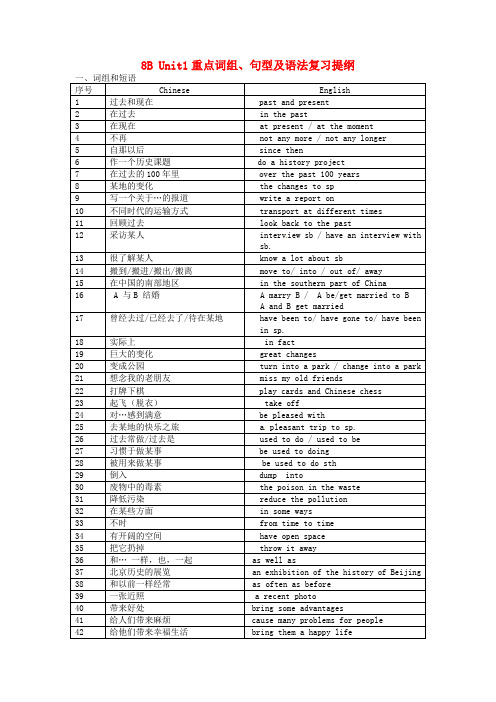
8B Unit1重点词组、句型及语法复习提纲序号Chinese English1 过去和现在past and present2 在过去in the past3 在现在at present / at the moment4 不再not any more / not any longer5 自那以后since then6 作一个历史课题do a history project7 在过去的100年里over the past 100 years8 某地的变化the changes to sp9 写一个关于…的报道write a report on10 不同时代的运输方式transport at different times11 回顾过去look back to the past12 采访某人interv iew sb / have an interview withsb.13 很了解某人know a lot about sb14 搬到/搬进/搬出/搬离move to/ into / out of/ away15 在中国的南部地区in the southern part of China16 A 与B 结婚 A marry B / A be/get married to BA andB get married17 曾经去过/已经去了/待在某地have been to/ have gone to/ have beenin sp.18 实际上in fact19 巨大的变化great changes20 变成公园turn into a park / change into a park21 想念我的老朋友miss my old friends22 打牌下棋play cards and Chinese chess23 起飞(脱衣)take off24 对…感到满意be pleased with25 去某地的快乐之旅a pleasant trip to sp.26 过去常做/过去是used to do / used to be27 习惯于做某事be used to doing28 被用来做某事be used to do sth29 倒入dump into30 废物中的毒素the poison in the waste31 降低污染reduce the pollution32 在某些方面in some ways33 不时from time to time34 有开阔的空间have open space35 把它扔掉throw it away36 和…一样,也,一起as well as37 北京历史的展览an exhibition of the history of Beijing38 和以前一样经常as often as before39 一张近照 a recent photo40 带来好处bring some advantages41 给人们带来麻烦cause many problems for people42 给他们带来幸福生活bring them a happy life43 一个新的旅游胜地 a new tourist attraction44 想起think of45 确保做某事be sure to do46 远离be far from47 一点也不n ot… a bit48 非常n ot…a little49 周围的青山绿水green hills and rivers around50 把某物落在某地leave sth sp51 和某人一起拍照take photos with sb52 拍某人的照片take photos of sb53 处于使用中be in service / be in use54 乘…去某地take … to sp /go to sp by….55 靠近next to56 更少的发展less development57 放学后在学校和朋友聊天stay after school to chat with friends58 同意某人的观点agree with sb59 同意做某事agree to do60 有更多的时间放松自己have more time to relax oneself61 在小学in primary school62 有同感have the same feeling63 自然美景natural beauty64 顺便问一下by the way二、重点句子及句型:1. ----Eddie,have you seen my food ? ----Yes. I’ve just eaten it.factory used to dump its waste into the river.(didn’t use to do/used not to do)have known the place since I was very young.lived together till 1965 when I got married.5.China has changed a lot. = Great changes have happened to China.= There have been gr eat changes in China.of them have moved to other areas and I feel a bit lonely from time to time.cannot see their friends as often as before.government realized it was a very serious problem and took action to reduce the pollution.has lived with Millie since he was born./last year/3years a go.have gone to the cinema already. John has been to the USA a few times. come to school by bus on my ownthinks he is unlucky enough to see the changes to Sunshine Town.will stay there for a whole week to enjoy the sun and the beach.wish you a happy holiday. = I wish you will have a happy holiday.changes to Moonlight Town have brought many benefits but they have also caused many problems for people.16. Some animals and plants have lost their living areas because of these change s.17. It no longer provides a good environment for wildlife. = It does n’t providea good environment for wildlife any longer., let me show you how to get to the train station.三、语法:1.现在完成时用法一:表示过去发生的动作对现在产生影响。
2023年牛津译林版八年级英语下册《Unit 1 Past and present》(Period

《Unit 1 Past and present》(Period 4)导学案【学习目标】1. 识记动词的过去分词形式。
2. 学习在语境中正确运用现在完成时。
3. 运用现在完成时谈论发生在过去并与现在有联系的事情。
【导学提纲】A. 你能翻译课文中的这些词组吗?快来试一试吧!1. 没有东西吃2. 许多次3. 完成他们的家庭作业4. 参观中国5. 修理十多辆自行车______________________6. 彼此见面7. 回来,返程8. 中国的历史9. 北京的变化10. 在过去的一个世纪里11.获知许多关于北京的过去与现在的情况______________________________________________12. 听说这部电影13.计划再看一次这个展览_______________________B. 写出本单元学过的3个现在完成时的句子,思考现在完成时如何构成。
1. _______________________________________________________________2. _______________________________________________________________3. _______________________________________________________________【展示交流】1. 小组检查单词的拼写和读音,纠正错误。
2. 小组检查归纳的3个现在完成时的句子,纠正错误。
3. 小组归纳总结现在完成时的用法和构成。
4. 小组总结动词过去分词的构成。
【个案补充】_____________________________________________________________________________________ _______________________________________________________________________________【盘点收获】现在完成时的时间表达词及用法1. already 肯定句,表示已经发生的事2. ever 疑问句,表示“曾经”3. for 肯定句/否定句/疑问句, 表示一段时间4. just 肯定句,表示“刚刚”5. never 否定句,表示“从不”6. since肯定句/否定句/疑问句, 表示“自……以来”7. yet疑问句/否定句,表示“还没有”8. recently肯定句/否定句/疑问句, 表示“最近”【反馈矫正】一、词汇根据提示写出单词,完成句子。
英语:牛津译林版八年级下册unit1《Past and present

Here are some photos of Beijing ten years ago. I also have some photos taken in Beijing this year.
Here are some photos of Beijing ten years ago. I also have some photos taken in Beijing this year.
Read and fill in the following table: Part2 (line10—31)
In the past
At present
People living in the town.
What we had/have in the town.
Water pollution
In the past
in size, price, etc. 7. throw away sth. You do not
want ,especially in a place which is not suitable.
since married dump realized reduce open space
lonely
Homework
Here are some photos of Beijing ten years ago. I also have some photos taken in Beijing this year.
New words 1. having a husband or wife 2. a large area without buildings 3. from a time in the past until now 4.got to know and understand sth. 5. unhappy because of being alone 6. make sth. less or smaller
Unit+1+Past+and+present知识点整理 牛津译林版英语八年级下册
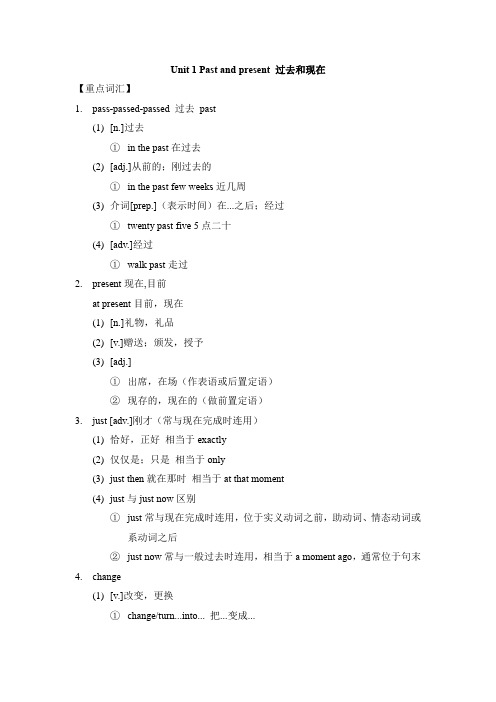
Unit 1 Past and present 过去和现在【重点词汇】1.pass-passed-passed 过去past(1)[n.]过去①in the past在过去(2)[adj.]从前的;刚过去的①in the past few weeks近几周(3)介词[prep.](表示时间)在...之后;经过①twenty past five 5点二十(4)[adv.]经过①walk past走过2.present现在,目前at present目前,现在(1)[n.]礼物,礼品(2)[v.]赠送;颁发,授予(3)[adj.]①出席,在场(作表语或后置定语)②现存的,现在的(做前置定语)3.just [adv.]刚才(常与现在完成时连用)(1)恰好,正好相当于exactly(2)仅仅是;只是相当于only(3)just then就在那时相当于at that moment(4)just与just now区别①just常与现在完成时连用,位于实义动词之前,助动词、情态动词或系动词之后②just now常与一般过去时连用,相当于a moment ago,通常位于句末4.change(1)[v.]改变,更换①change/turn...into... 把...变成...(2)[n.]变化,变革;零钱(不可数名词)5.since[conj.]&[prep.]自……以来6.ever[adv.]曾经7.northern北方的,北部的southern western eastern8.married已婚的,结婚的(1)get married结婚(2)be married已婚(3)be/get married to sb.与某人结婚9.wife妻子-wives[pl.](1)knife-knives(2)wolf-wolves(3)thief-thieves(4)half-halves(5)leaf-leaves10.away[adv.]离开,在(某距离)处(1)go away离开(2)right away立刻(3)take away带走(4)run away逃离(5)put away收起来(6)far away远离(7)keep...away from... 使...远离...11.block街区12.pollution污染;污染物(1)[v.]pollute(2)light pollution光污染(3)air pollution空气污染(4)water pollution水污染(5)noise pollution噪声污染13.problem[n.]问题,难题(1)question与ask/answer(2)problem难以解决问题solve/work out连用14.factory工厂15.waste(1)废料;废品(不可数名词)(2)[n.]浪费,可以和冠词a连用(3)[adj.]废弃的,无用的;荒芜的(4)[v.][新义]浪费,滥用①waste sth. on sth.浪费某物在某物/事上②waste sth. (in) doing sth.浪费某物做某事16.realize[v.]意识到;实现(1)realize实现,是及物动词,被实现(2)come true实现,成为现实,是不及物动词,不能用于被动语态17.situation形势,情况18.husband丈夫19.impossible[adj.]不可能的(1)impossibly[adv.](2)possible[adj.]-possibly[adv.](3)possibility[n.]可能性20.interview采访;会见[新义]n.对……进行面试;采访21.environment环境condition环境,条件,状况22.lonely和alone(1)lonely形容词孤独的,强调人的内心感受;偏僻的。
[初二英语]英语Unit 1 Past and present重点语法和句型(译林牛津八年级下)
![[初二英语]英语Unit 1 Past and present重点语法和句型(译林牛津八年级下)](https://img.taocdn.com/s3/m/f92237f0195f312b3169a560.png)
Unit 1 Past and present一. 教学内容:Unit 1 Past and presentwords, phrases and sentences二. 教学目标:掌握Unit 1的词汇及词性变化和课文中的重点词组、句型的结构和用法Unit 1 Past and present(一)基础词汇过去,往事past目前,现在present(n. 现在,通常与过去、将来相对应。
The past, the present and the future . 过去、现在和将来。
at present. 此刻、现在: I’m afraid I can’t help you just at present. ----- I’m too busy. 很抱歉,我现在帮不了你,----- 实在太忙了。
adj. 现在的。
the present day当今、现今。
Most young people enjoy listening to popular music the present day. )刚刚just(just, adv. 刚才。
常用于完成时态,在美式英语中用于一般过去时。
)I have just seen John. 我刚才见到约翰了。
I just saw him. (a moment ago). ( U. S)我(几分钟前)看到他的。
( U. S)自……以来since(since. 后面通常接点时间来表示一段时间。
例如:since 1984 自从1984年一直到现在。
since 3 days ago. 自从三天前一直到现在,也可以说成for 3 days 通常用how long提问。
How long has your uncle lived here? Since 1980. )南方的southern到……时till已婚的married(marry. vt. vi marry sb. 与某人结婚;嫁或娶某人。
牛津译林版八年级英语下册《Unit1 Past and present》word list1课件

Guide One
1.Learn to read the new words.
❖ Please try to read the words from (6) to (11) on Page 140 and try to find out the words which you can’t read.(2')
❖ 2.Kitty got_____(结婚的) last year. Her h_______ is a computer engineer.
❖ 3.---Have you______(曾经) thought of moving to a big city?
❖ ---No, never. ❖ 4.I want to go travelling,_______(但是), I have no idea
❖ 8.Mr Chen lived a______,but he didn’t feel l_____. ❖ 9.I have lived in Donghai _______(自...以来) I
was born. ❖ 10.People often throw the_______(废品) into the
❖Unit1 Past and present
❖ 【Words from (6 ) to (11)】
❖Learning aims:
❖ 1. To know and read the words from (6) to (11) on Page140 correctly.
❖ 2. To remember the words according to their pronunciation and Chinese and use them correctly.
- 1、下载文档前请自行甄别文档内容的完整性,平台不提供额外的编辑、内容补充、找答案等附加服务。
- 2、"仅部分预览"的文档,不可在线预览部分如存在完整性等问题,可反馈申请退款(可完整预览的文档不适用该条件!)。
- 3、如文档侵犯您的权益,请联系客服反馈,我们会尽快为您处理(人工客服工作时间:9:00-18:30)。
Could you tell me anything about Mr. Chen?
Step2Pre-task
Recentlywe havealreadyknown a little a boutSunshineTown. I have neverbeen there before. Have youeverbeen there?
I havejustseen Millie on the playground.
Has Millie calledyet? No, she hasn’t.
I have not hea rd from Millieyet.
I have done my homeworkalr eady.
I haveneverread the novel.…
5. I have taught in the school _____ I came here.
6. We have been friends ____ a long time.
总结: for +段时间
since +点时间(过去时间)
since +句子(一般过去时态的 句子)
C.句型转换
1. The boy has already gone home. (一般疑问句)
2. The girl has already given it to me.(否定句)
3.They have ever visited theHainanIslandbefore .(否定句)
1.现在完成时)肯定句变为否定句的基本方法:
2.(现在完成时)肯定句变为一般疑问句的基本方法:
3.注意点:just、already、yet之间的关系及各自适应的句型
He has worked there _______ he left school. (dy, just, since)
Have you cleaned your room _______? (for, just, yet)
She has known Sam _____ nine years. (for, never, since)
1) Tell the students that we can use adverbs of time with the present perfect t ense, such asalready, ever, for, just, never, since and yet.
2) Some more examples:
Past and present
教学目标
1.学习现在完成时的时间副词和时间短语。
2.能在语境中运用现在完成时。
重点
现在完成时与一般过去时在时间副词用法区别。
难点
现在完成时与一般过去时在时间副词用法区别。
教法及教具
教
学
过
程
教学内容
个案调整
教师主导活动
学生主体活动
Step1Lead-in
The teacher can have a free talk with the students.
B. for or since
1. We have lived here ____ 1990.
2. How long have you studied here? ___ 5 years.
3. The boy has had a bad cold _____ last night.
4. Mr. Huang has kept the books ______ a week ago.
Step4 Exercises
A.选择填空(See PPT)
Have you done your homework ______? (for, just, yet)
I have _______ __been toChengdu. (eve r, never, yet)
He has _______ washed the dis hes . (already, ever, for)
Read ,write and remember.
板书设计
教学札记
S1: No, I haven’t been thereyet.
T: Mr. Chen was born there. He has known itsincehe was very you ng. He has known itfora long time.
Step3While-t a sk
Task 1
Have you ______ ridden a horse? (ever, for, yet)
They have ______ arrived. (ever, just, yet)
We have not completed the project _______. (already, for, yet)
